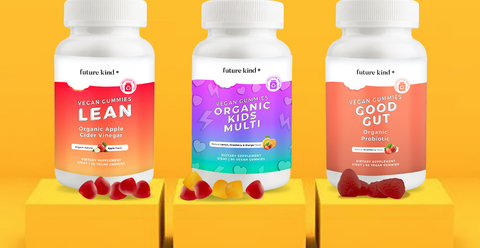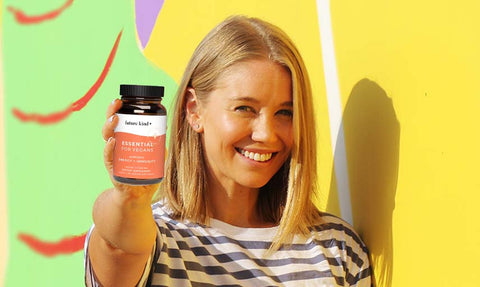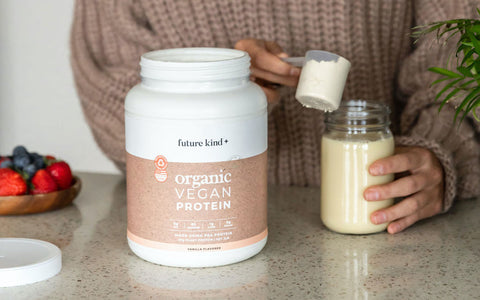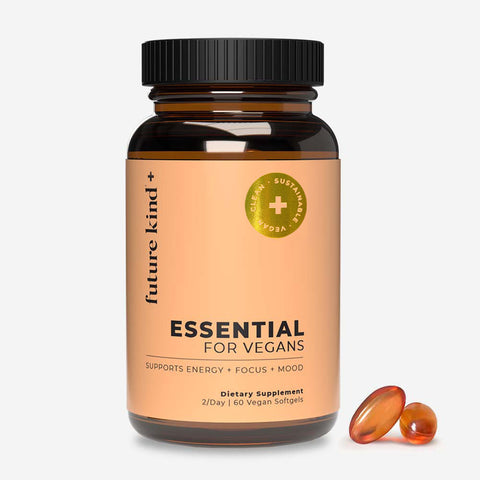Reading time: 3 minutes
There are two ways you can go vegan: by eating crap like sugary biscuits, chips, and sour gummies (which are technically vegan as they don’t contain animal products) or the healthy way by eating whole foods, whole grains, and a lot of fruits and veggies, ensuring all your nutrients are met. We, of course, suggest the latter.
Did you know that the world’s obesity levels tripled since 1975? If you ask us, this is directly correlated to the ubiquitous heavily-processed junk food and the aggressive marketing that accompanies it. In this article, we’ll talk about a few significant vegan nutrition facts that will keep you on the healthy vegan path.
Vegan Nutrition Facts You Need to Live Your Best Life
Going vegan doesn't have to be difficult. With these eight health facts, you can be sure to hit your fitness goals as well as living as healthy as possible. Let’s get to it.

1. Eat Foods Your Grandmother Could Recognize
A great rule of thumb to follow when following a vegan lifestyle is to eat a whole food, natural plant-based diet. Whole foods are defined as unprocessed foods that are refined as little as possible. Great choices for these foods are grains, seeds, legumes, fruits, and vegetables. 
2. Get Your Vitamins From Food First
Even though we’re a vegan vitamin company, we are a big proponent of getting as many of your vitamins from whole food sources (rather than vitamins) as you can. You can do this by eating a well-balanced diet full of many colors and different types of fruits and vegetables.
Eating leafy and cruciferous vegetables like kale and spinach are a great source of Vitamins E, K, C, B2, calcium, and folic acid. To get more Vitamin E, consider incorporating sunflower seeds, papaya, almonds, and olives into your diet.
Need more folic acid? Opt for beans, lentils, and asparagus. If calcium is what you’re looking for, try to include more broccoli, chickpeas, calcium-soaked tofu, and fortified plant milks/juices. To get a sufficient amount of zinc, try eating these excellent plant-based sources: whole grains, tofu, sprouted bread, legumes, nuts, seeds, and tempeh.
3. And Supplement When You Can’t
When enjoying a vegan lifestyle, there are just a few essential nutrients that are hard to get enough of like Vitamin B12, Vitamin D3, and Omega-3s. Luckily for us, we don’t have to sacrifice our ethics, morals, or our health to get everything we need thanks to vegan supplements.
It’s nearly impossible to get optimal levels of Vitamin B12 on a vegan diet unless you’re eating your weight in mushrooms or dirt. Get the entire rundown here. Depending on where you live on the globe, the weather, and how often you sunbathe, Vitamin D3 is a tricky bugger to get enough of and so are the Omega-3 fatty acids EPA & DHA, but we’ll talk about that in more detail below.

4. Fruit Juice Can Be Just as Unhealthy as a Sugary Drink
Drinking fruit juice is basically the equivalent of an IV of straight sugar. Even though most juices are packed with antioxidants, they, unfortunately, don’t outweigh the detriments of sugar.
Eating fruit is often very filling; it’s unlikely you’d eat 26 apples in one sitting. However, when it comes to juice, it's easy to consume loads of it at once. When we drink too much fruit juice, our liver begins to panic as it becomes flooded with a sugar overload. Its defense mechanism is to turn all the fructose it can’t keep up with into fat.
Fruit juice misses what makes fruit so healthy---the fiber. If you’re craving something sweet, skip the juice cleanse and go straight to the source, a whole piece of fruit. Your insides will thank you.

5. Artificial Trans Fats Are The Devil
Artificial trans fats are liquid fats that are engineered into a solid state. Think margarine. At one point it was vegetable oil but with a little high pressure, hydrogen gas, and a metal catalyst you now have margarine.
Not only is the process unnatural, but also it’s very unhealthy for our bodies. Numerous studies have linked artificial trans fats with heart disease, insulin sensitivity, type II diabetes, and inflammation. We’ll stick to smashed avo on our toast, thank you.

6. Eat More Omega 3 Fatty Acids
Omega 3 fatty acids are critical nutrients to the human body and are essential to your brain and mental health. There are three types of omega-3s: ALA, EPA, and DHA. ALA can be found in seeds and brussels sprouts, but the only plant-based source of DHA and EPA is algae oil.

7. Added Sugar is Also the Devil
We try to avoid added sugar as much as possible, which is pretty simple when you’re sticking to a whole foods diet. The problem with too much added sugar is that it can lead to obesity, high blood pressure, and inflammation. Too much refined sugar also increases your risk for heart disease, certain cancers, and diabetes.
8. Steer Clear of a Vitamin D-ficiency
Vitamin D, the sunshine vitamin, is harder to get than you think. If you’re vegan and eat plenty of fortified foods, it’s possible to get enough Vitamin D2. However, chances are you’re not eating the foods that contain Vitamin D3, the most important form since none of them are vegan.
This vitamin is so essential to our body that we make it ourselves when exposed to sunlight. However, this is tricky depending on where you live, the weather, the seasons, and how often you sunbathe without sunscreen.
Stay in the Know
Basically, if you eat a varied, colorful diet of whole foods, seeds, fruit, vegetables, grains, and fats, and pair it with a vegan multivitamin, your diet will be in a great place. We’ve rounded up some easy vegan recipes that will help deliver your daily nutrition. Get the goods here.














Comments (0)
There are no comments for this article. Be the first one to leave a message!